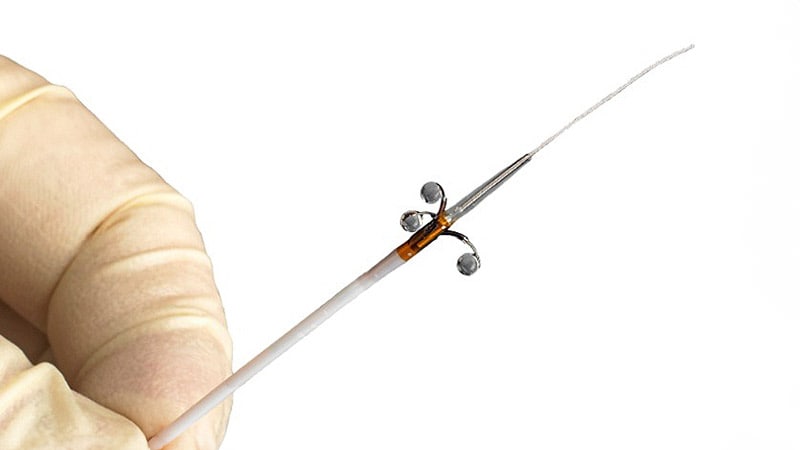Alcohol-Mediated Renal Denervation Shows Modest but Significant Blood Pressure Reduction in Patients with Uncontrolled Hypertension
Core Concepts
Alcohol-mediated renal denervation significantly reduces 24-hour ambulatory systolic blood pressure in patients with uncontrolled hypertension, but the overall results are not as promising as researchers had hoped.
Abstract
The study was a phase 3, international, sham-controlled trial called TARGET BP I that included 301 mostly male patients with uncontrolled hypertension despite antihypertension therapy. Patients were randomized to either alcohol-mediated renal denervation (RDN) or sham control.
Key findings:
- The change in mean 24-hour ambulatory systolic blood pressure (SBP) from baseline to 3 months was greater in the RDN group than in the sham control (-10.0 vs -6.8 mmHg), with a significant between-group difference favoring RDN (-3.2 mmHg).
- However, there was no significant difference in office BP between groups at 3 months, with a large BP reduction seen in the sham control group.
- Medication adherence, evaluated through blood and urine testing, was similar between groups but lower than reported in previous trials.
- There were very few adverse events related to the device or the procedure, with most events related to hypotension requiring intervention or medication change.
- Renal function remained unchanged from baseline through 3 and 6 months in both groups.
The authors noted the unexpectedly large reduction in BP observed in the sham control group merits further study, and the inconsistency of medication adherence could confound the results.
Customize Summary
Rewrite with AI
Generate Citations
Translate Source
To Another Language
Generate MindMap
from source content
Visit Source
www.medscape.com
Alcohol-Mediated Renal Denervation Promising in Hypertension
Stats
Baseline mean 24-hour SBP/DBP was 146.3/87.2 mmHg for the RDN group and 146.2/87.6 mmHg for the sham control group.
Baseline mean office BP was 164.3/98.4 mmHg for the RDN group and 163.9/100.0 mmHg for the sham control group.
The change in mean 24-hour ambulatory SBP from baseline to 3 months was -10.0 mmHg for the RDN group and -6.8 mmHg for the sham control group, with a significant between-group difference of -3.2 mmHg.
At 3 months, the change in office BP was -12.7 mmHg for the RDN group and -9.7 mmHg for the sham control group, with no significant difference between groups.
Medication adherence rates increased from 43% and 41% at baseline to 51% and 49% at 3 months for the RDN and sham control groups, respectively.
Quotes
"We saw a modest but statistically significant difference in the primary endpoint, but there were no significant differences in other measures of blood pressure, including office systolic or diastolic blood pressure."
"The unexpectedly large reduction in BP observed in the sham control group merits further study."
"If you're thinking about methods to offer patients to reduce their blood pressure when they're already maxed out on blood pressure medicines, this potentially offers them another treatment option."
Key Insights Distilled From
by Pauline Ande... at www.medscape.com 04-17-2024
https://www.medscape.com/viewarticle/alcohol-mediated-renal-denervation-promising-hypertension-2024a10007eg
Deeper Inquiries
What are the potential long-term effects of alcohol-mediated renal denervation on renal function and overall cardiovascular health?
Alcohol-mediated renal denervation (RDN) presents potential long-term effects on renal function and overall cardiovascular health. While the initial results of the phase 3 trial showed a significant reduction in 24-hour ambulatory systolic blood pressure (SBP), the long-term impact on renal function needs further investigation. Injecting alcohol into the perivascular space of the renal artery could potentially lead to fibrosis or other complications if the alcohol were to escape outside the renal artery wall. This could result in adverse effects on renal function over time. Additionally, the impact of alcohol-mediated RDN on cardiovascular health, including its efficacy in reducing cardiovascular events and mortality rates in the long term, remains to be fully understood. Further studies with extended follow-up periods are necessary to assess the sustained effects of this intervention on renal function and overall cardiovascular health.
How can medication adherence be improved in patients with uncontrolled hypertension, and what role could alcohol-mediated renal denervation play in a comprehensive treatment approach?
Improving medication adherence in patients with uncontrolled hypertension is crucial for effective management of the condition. Several strategies can be employed to enhance adherence, including patient education, simplifying medication regimens, utilizing reminder systems, and addressing barriers to adherence such as cost or side effects. In the context of alcohol-mediated RDN, this intervention could potentially offer an additional treatment option for patients who are already on multiple antihypertensive medications and struggling with adherence. By providing a minimally invasive alternative to traditional RDN procedures, alcohol-mediated RDN may appeal to patients who have difficulty adhering to complex medication regimens. Integrating alcohol-mediated RDN into a comprehensive treatment approach for uncontrolled hypertension could offer patients a novel therapeutic option that complements existing strategies and helps improve overall blood pressure control.
Given the unexpected findings in the sham control group, what other factors beyond the intervention itself may be contributing to blood pressure reduction in this patient population?
The unexpected findings in the sham control group, where a large reduction in blood pressure was observed, raise questions about factors beyond the intervention that may be influencing blood pressure reduction in this patient population. One possible factor could be the placebo effect, where patients experience improvements in their condition due to the belief that they are receiving an active treatment. The psychological impact of undergoing a procedure, even if it is a sham intervention, could lead to physiological changes that result in reduced blood pressure. Additionally, variations in medication adherence, lifestyle modifications, or other unmeasured confounders could be contributing to the observed blood pressure reductions in the sham control group. Further exploration of these factors is essential to fully understand the mechanisms driving blood pressure changes in patients with uncontrolled hypertension, both in the context of the intervention and in the control group.
0
